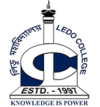NIRF DATA 2025
3rd Merit List- Faculty of Education
Merit List of selected candidates for Admission in First Semester, Ledo College
AQAR 2021-22
Student Satisfaction Survey 2021-22
AQAR- 2020-21

Ledo, Dist: Tinsukia (Assam)
ledocollege@yahoo.co.in
03751225444

CBCS: CBCS means Choice Based Credit System. Choice Based Credit System is a flexible system of learning. “Credit defines the quantum of contents/ syllabus prescribed for a course determines the number of hours of instruction required. This system permits students to
Programme: The term ‘programme is used to mean the whole learning experience or combination of courses in a particular field of study.
Course:A Programme is divided into a number of courses. A course is a unit of instruction or segment of subject area under any programme. The traditional concept “paper’ is replaced by course.
Academic Year: An academic year means a period of twelve months consisting of two semesters.
Semester: The word “semester” is used to mean a half-yearly term or term of studies including examinations, vacations and semester breaks. Semester Duration: A semester normally extends over a period of 15 class weeks. Each week has 30 hours of instruction spread over the week.
In-semester: The word “in-semester” is used to refer to the continuous evaluation within the half-yearly term.
End-semester: The word “end-semester” is used to refer to the terminal processes of examinations and evaluations at the end but within the half-yearly term.
Credit: ‘Credit’ defines the quantum of contents/ syllabus prescribed for a course and determines the number of hours of instruction required per week. Thus, normally in each of the course, credits will be assigned on the basis of the number of lectures/tutorials/ laboratory work and other forms of learning required to complete the course contents in a 14-15 week schedule:
Odd Semesters: June-November (including end-semester examinations and semester breaks)
Even Semester: December -May (including end-semester examinations and semester breaks)
Admission Criteria:
The Course Structure of the Academic Programmes under the CBCS shall be as per the Course Structure given in Annexure I. The nature of the Courses for all Under Graduate Academic programmes shall be as below:
Core Courses: Compulsory components of an Academic Programme. These Courses are to be compulsorily studied as a core requirement for the programme. The contents of the Core Courses shall be as per the UGC Model Curriculum for the subject/ discipline concerned. However, the Boards of Studies concerned may recommend maximum of 20% deviation from the UGC Model Syllabi wherever requires.
In case, UGC does not provide model Syllabi/ Curriculum, the Board of Studies shall propose their own Core Courses keeping parity of total numbers of credits/ courses with other similar subjects/ disciplines.
Elective Courses: Elective courses shall be chosen by each student from a pool of courses. These courses may be intra-departmental. i.c. Discipline Specific Elective (DSE) as well as inter departmental. i.c., Generic Elective (GE). The students shall have to choose minimum number of DSE and GF in every semester as prescribed in the Course Structure.
There shall be a basket of at least eight Elective Courses having equal number of credits. For the students of the same discipline/ subjects these elective courses shall be intra-disciplinary and shall be called DSE Courses. If the students of other discipline/ subjects (within the Programme) opt these electives shall be considered as inter-disciplinary and shall be called GE courses. Further, there may be few courses conducted under the UGC’s Programmes on Massive Open Online Course (MOOC)s. The University may time to time fix the criteria for MOOCs as per the relevant UGC Guidelines on digital education.
Ability Enhancement Courses (AEC): The Ability Enhancement Courses shall be of two kinds Ability Enhancement Compulsory Courses’ and ‘Skill Enhancement Courses. These courses shall be inter-disciplinary (within the Programme) in nature. “AEC’ Courses are the courses based upon the content that leads to Knowledge enhancement. Ability Enhancement Compulsory Courses (AECC):(a) Environmental Science (2 Credit). (b) Communicative English (2 Credit) and (c) Alternative English /MII. (2 Credit).
For BA (Non-Honours) Programmes, there shall be a Multi-disciplinary Course of 4 Credits.
Provided that it shall be open to the University to grant exemption to a student who has attended a minimum of 70% classes but failed to obtain the prescribed 80% attendance for valid reasons, on recommendation of the Head/Chairperson/ Principals of the Department/ Centre/ College on payment of a prescribed fee(s).
The Principals of the Colleges shall announce the names of all students who shall not be eligible to take the End-semester examinations in the various courses and send a copy of the same to the Controller of Examinations. Such candidates shall have to repeat the concerned course (s) when it is offered next.
A student declared as discollegiate shall not be allowed to proceed to the next higher Semester.
He/She shall need to pursue the Semester afresh in which he/she was declared as discollegiate along with the next fresh batch.
Internal Assessment:
End Semester Examination:
2. A candidate shall be declared as passed a semester/ programme, provided he/she secures at least ‘P’ grade in the 10 point scale (given in clause) in all the Courses separately.
3. There may be moderation of Internal Assessment marks/End Semester marks as and when necessary.
4. The marks of In-semester examinations obtained by the candidate shall be carried over for declaring any result.
5. A candidate who fails or does not appear in one or more courses of any end semester examinations up to Sixth Semester shall be provisionally promoted to the next higher semester with the failed course as carry over course(s). Such candidates will be eligible to appear in the carry over course in the next regular examinations of those courses.
6. If a candidate clears the sixth semester examination before clearing all the courses of the previous semesters, the result of the sixth semester examination of that candidate shall be withheld and his/her results shall be announced only after he she clears the courses of the previous semesters.
A student must clear all his/her Semester Examinations within Six (6) years from the dates of admission to the First Semester of any Programme irrespective of the number of examinations appeared by the students, viz. First and Second Semester Examinations shall have to be cleared in six consecutive chances. Third and Fourth Semester Examinations shall have to be cleared in five consecutive chances and Fifth and Sixth Semester Examinations in four consecutive chances.
7. However, after the first chance of the Fifth and Sixth Semester Examinations, the candidate shall be considered as a non-regular candidate.
8. Since the Semester system involves continuous assessment, there shall be no scope for a student to appear as a private candidate in any programme in this system.
9. A candidate shall be declared to have passed the Bachelors Degree in the concerned discipline provided he/she has passed all the Semesters and in all the Courses separately.
10. The Controller of Examinations shall declare the results of the DU-UG CBCS Examinations and issue Grade-sheets.
11. The first rank holder of a programme shall be decided on the basis of the CGPA. However, the Overall Weighted Percentage of Marks (OWPM) of a candidate shall be considered in case of the in CGPA.
Letter Grade with meaning | Grade Point* | |
O | Outstanding | 10 (Marks securing above 90%) |
A+ | Excellent | 9 Marks securing 80%-90%) |
A | Very Good | 8 Marks securing 70% -80%) |
B+ | Good | 7(Marks securing 60% -70%) |
B | Above Average Pass | 6(Marks securing 50% -60%) |
P | Pass | 5 (Marks securing 40% -50%) |
F | Fail | 0(Marks securing below 40%) |
Abs | Absent/ Incomplete | 0 |
*Exclusive Class Interval technique shall he followed in calculation of Grade Point.
3. The Letter grade B. and above shall be considered as First Class and Letter grade ‘B’ shall be considered Second Class.
4. A student is considered to have completed a course successfully and earned the prescribed credits if he/she secures a letter grade other than F (Failed) or Abs’ (Absent/ Incomplete).
5. If a candidate secures “F” grade in a Course, he/she shall have to reappear in the Course in the next legitimate chance.
6. If a student secures F” grade in Project Work/ Dissertation/ assignment etc., he/she shall have to re-submit it after necessary revisions. The Result shall be declared with next regular batch.
7. ‘Abs’ grade shall be awarded to a candidate if he/she has not fulfilled the following requirements:
8. The candidates not appearing in a Semester Examination shall be considered as an ‘Abs’ candidate and that will be reflected in the Grade Sheet of the candidate. These candidate shall have to convert the ‘Abs’ grade by appearing in the next examination on the Course (provided he/she has legitimate chance to appear the Course) concerned or by submitting project work/dissertation/ assignment etc. 8.9 Results of the candidates appeared in the Betterment or Backlog Examinations shall not be counted for the award of Prizes/Medals, Rank or Distinction.
The University may issue consolidated Transcript on payment of a prescribed fee which shall contain Letter grades, grade points and SGPA and CGPA mentioning the Course Titles in details, medium of instruction and programme duration.
Inter-Institutional transfer of Credits may be considered by the Dibrugarh University on reciprocal basis or in compliance with the relevant Guidelines of the UGC.
Rules for Admission on Transfer from other University:




The marks allotted for Internal Assessment (20%) in cach course shall be based on the following:
a) Sessional Examination I (Written): 25% of the marks allotted for internal assessment
b) Sessional Examination II (Written): 25% of the marks allotted for internal assessment.
c) Seminar/ Group Discussion: 25% of the marks allotted for internal assessment.
d) Attendance: 25% of the marks allotted for internal assessment.
Fach sessional examination shall be conducted by the concerned teacher(s) of the course. The setting of question paper, invigilation duty, evaluation of answer scripts for each paper shall be done by the concerned teacher(s) as a part of his/her/their normal duty. The teacher concerned shall fix the date of the sessional examination of cach course complying with the Academic Calendar of the University.
The students shall have to write the answers in the scripts provided and duly authenticated by the college/ institute concerned.
After evaluation, the answer scripts should be shown to the students and corrections should be made if necessary. After this, the answer scripts should be collected back from the students.
There shall be no provision for “repeat” “betterment” in the sessional examination. If a student misses any sessional examination for unavoidable reasons, the concerned teacher may allow the student to appear in a separate examination at his/her own discretion.
The marks of internal assessment secured by a candidate shall be carried over to next legitimate chances.
If a course is taught by more than one teacher then the concerned teachers shall conduct the process of internal assessment together.
If any student fails to appear in internal assessment. he/she shall not be eligible to appear in the end semester examinations of the course(s) concerned. The colleges/ institutes shall notify the same prior to filling up forms for examinations.
Copyright All Right Reserved 2021, Ledo College
This site is Designed and Maintanance by AIITA Computer, Ledo
